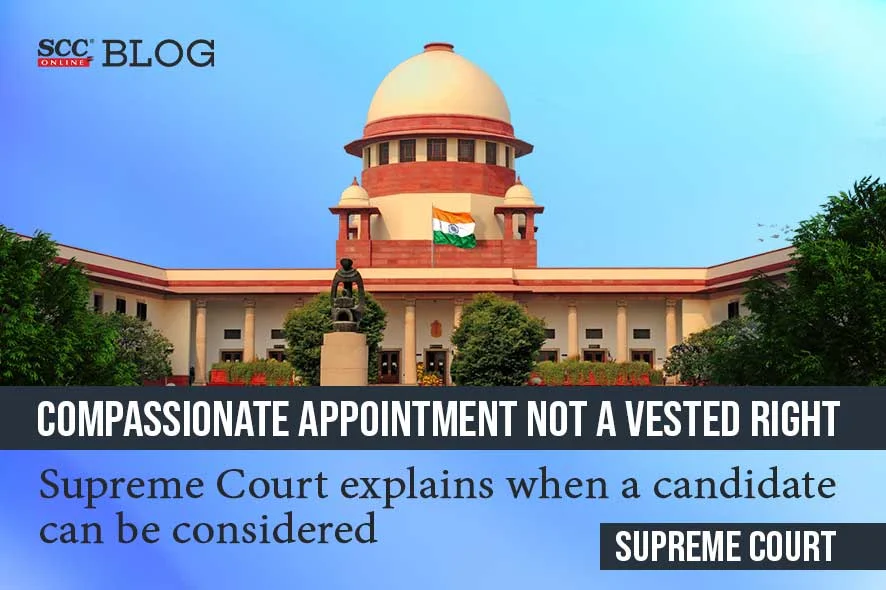Supreme Court: In an appeal filed by the Bank of Baroda (‘Bank’) against judgment and decree passed by the Punjab and Haryana High Court, wherein the Court has set aside the judgment of the First Appellate Court and has restored the judgment of the Trial Court, granting the respondent declaration and mandatory injunction vis-a-vis his appointment in the Bank on a compassionate basis, the division bench of BV Nagarathna and Manoj Misra, JJ. while setting aside the impugned judgment, reiterated that the appointment of a candidate on compassionate basis does not create any vested right and that it is only when a candidate is covered under all clauses of the Scheme applicable at the relevant point of time that he/she could be considered for compassionate appointment.
Background:
The respondent’s father was working in the Bank and died in harness in 1999. The Bank had a Scheme in place for appointment of dependents of the deceased employees on compassionate grounds which was issued in 1998. It is the respondent’s case that on the death of his father in harness, his mother made an application for his appointment on compassionate grounds to the post of Peon under the 1998 Scheme. During the pendency of the said application under consideration, the Bank announced another Scheme for appointment of the dependents of deceased employees on compassionate grounds in 2004. Four years after the death of his father, another representation on behalf of the respondent was made to the Bank, which the Bank rejected. Aggrieved, the respondent filed a suit, wherein the Trial Court directed the Bank to appoint the respondent on compassionate grounds. Thereafter, the Bank filed an appeal before the Additional District Judge, wherein the Court set aside the Trail court’s decree. Thereafter, the respondent filed a second appeal before Punjab and Haryana High Court, wherein the Court set aside the judgment of the First Appellate Court and restored the judgment and decree of the Trial Court. Hence, the respondent filed the present appeal.
Issue:
Whether the High Court was justified in setting aside the judgment of the First Appellate Court and restoring the judgment and decree of the Trial Court while answering the questions of law in favour of the respondent and against the Bank?
Analysis:
The Court reiterated that the appointment of a candidate on compassionate basis does not create any vested right and that it is only when a candidate is covered under all clauses of the Scheme applicable at the relevant point of time that he/she could be considered for compassionate appointment.
The Court after referring to SBI v. Kunti Tiwary, (2004) 7 SCC 271, the Court said that when a deceased employee’s family is in penury and without any source of livelihood when the employee died in harness, compassionate appointment can be considered. Since appointment on compassionate basis is an exception to the general rule for appointment by an open invitation, the exception has to be resorted to only when the candidate and his family is in penury so as to provide immediate aid on the death of the employee in harness. Further, it took note of State of H.P. v. Shashi Kumar, (2019) 3 SCC 653 wherein it was observed that compassionate appointment being an exception to the general rule, the dependents of deceased government employee are made eligible by virtue of the policy of compassionate appointment, and they must fulfil the terms of the policy which are framed by the States/Employers.
The Bench relied on State of H.P. v. Parkash Chand, (2019) 4 SCC 285, wherein it was held that a direction by a High Court to consider cases for compassionate appointment other than the terms of the policy is impermissible, as it would amount to re-writing the terms of the policy. As per the Court, this aspect has been overlooked by the High Court in the instant case. Further, the Bench took note of Indian Bank v. Promila, (2020) 2 SCC 729, wherein it was observed that eligibility for compassionate appointment must be as per the applicable scheme and the courts cannot substitute a scheme or add or subtract from the terms thereof in exercise of judicial review. The Court said that this will also apply to a suit filed seeking the relief of compassionate appointment.
Further, after perusing the clauses of the Scheme, the Court held that the High Court was not right in setting aside the judgment of the First Appellate Court and restoring the judgment of the Trial Court.
[Bank of Baroda v. Baljit Singh, 2023 SCC OnLine SC 745, decided on 21-06-2023]



